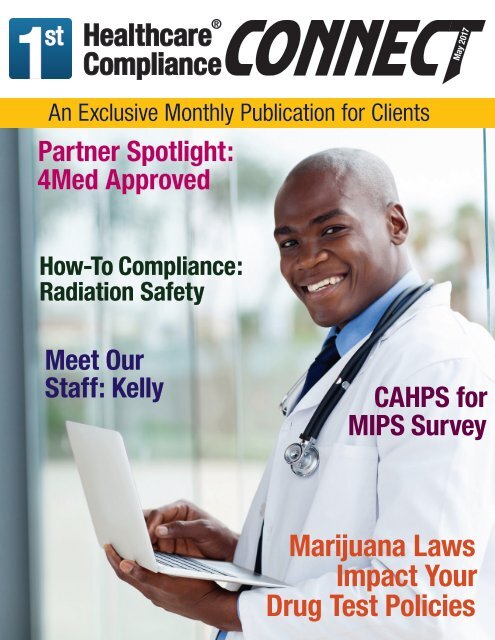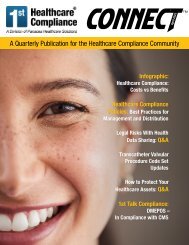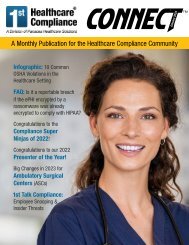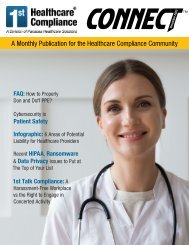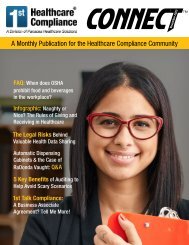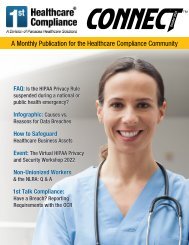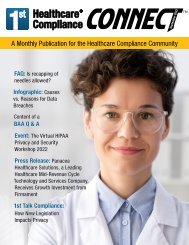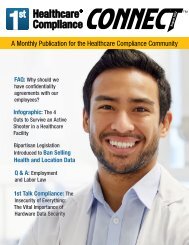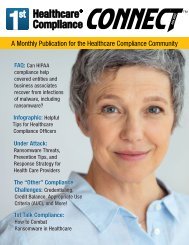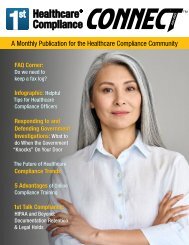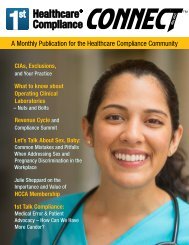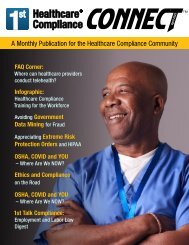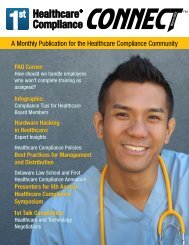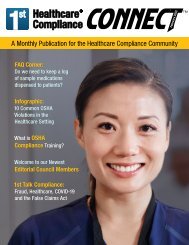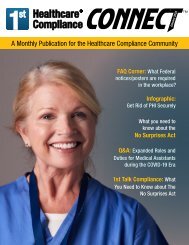First Healthcare Compliance CONNECT- May 2017
You also want an ePaper? Increase the reach of your titles
YUMPU automatically turns print PDFs into web optimized ePapers that Google loves.
®<br />
<strong>CONNECT</strong><br />
An Exclusive Monthly Publication for Clients<br />
Partner Spotlight:<br />
4Med Approved<br />
<strong>May</strong> <strong>2017</strong><br />
How-To <strong>Compliance</strong>:<br />
Radiation Safety<br />
Meet Our<br />
Staff: Kelly<br />
CAHPS for<br />
MIPS Survey<br />
Marijuana Laws<br />
Impact Your<br />
Drug Test Policies
Important <strong>Compliance</strong> Dates<br />
January<br />
1<br />
January<br />
1<br />
January<br />
1<br />
Ongoing from January 1 is the start of MACRA collecting performance<br />
data with last possible day to begin October 2.<br />
<strong>2017</strong> EHR Stage 2 Medicaid reporting period is a minimum of any<br />
continuous 90 days between January 1- December 31, <strong>2017</strong>.<br />
<strong>2017</strong> EHR Stage 3 Medicaid for all new and returning participants,<br />
the EHR reporting period is a minimum of any continuous 90 days<br />
between January 1- December 31, <strong>2017</strong>.<br />
February June<br />
21<br />
Effective June 21, <strong>2017</strong>, Advanced Beneficiary Notice (ABN) Form<br />
Update -Must use most recent version of CMS R-131.<br />
July<br />
1<br />
Practitioners in 9 states are required to report on claims data on<br />
post-operative visits furnished during the global period of specified<br />
procedures using CPT code 99024, beginning July 1, <strong>2017</strong>.<br />
In This Issue:<br />
Important <strong>Compliance</strong> Dates<br />
Meet Our Staff<br />
Marijuana Laws Impact Your Organization’s Drug Testing Policies<br />
How-To <strong>Compliance</strong> Series: Radiation Safety<br />
2<br />
<strong>First</strong> <strong>Healthcare</strong> <strong>Compliance</strong>, LLC © <strong>2017</strong>
Meet Our Staff<br />
Kelly Anderson<br />
National Inside Sales Manager<br />
What aspect of your role do you enjoy the most?<br />
I really enjoy presenting a solution to clients that truly helps solve a problem. When<br />
you can help someone in his or her day to day job and know that you have a part in<br />
making their situation better, relieving them of some stress, that’s a good day!<br />
Before working at <strong>First</strong> <strong>Healthcare</strong> <strong>Compliance</strong>, what was the most unusual or interesting job you’ve ever had?<br />
My very first “real” job, at 16, was to be the “salad” girl at the local steakhouse. I kept the salad bar bins full. One very busy<br />
night, I had to get the 5 gallon tub of blue cheese dressing off the top shelf of the walk-in fridge and dumped the whole thing<br />
all over me, head to toe! Not a good look...<br />
Would you rather have telepathy or telekinesis?<br />
I’m not sure I believe in either, and I’m not sure I WANT to read other’s minds! But if I had to choose, perhaps moving things<br />
around at will could be fun!<br />
CAHPS for MIPS Survey<br />
Partner Spotlight: 4Med Approved<br />
System FAQs<br />
Webinar Q&A: OSHA Bloodborne Pathogen and<br />
Hazard Communication Training<br />
Upcoming Webinar Calendar<br />
Contact Toll Free: 888-54-FIRST 3
By Sheba Vine, JD, CPCO<br />
The growing trend in marijuana laws have presented a unique challenge<br />
for employers— the conflict between federal and state laws<br />
leave most employers in a daze. Given that some states place restrictions<br />
on marijuana drug testing, employers need a clear understanding<br />
to avoid the legal ramifications that can be caused by outdated<br />
drug testing policies.<br />
Marijuana use is illegal under the federal U.S. Controlled Substances<br />
Act of 1970 (CSA), which classifies marijuana as a Schedule I prohibited<br />
substance. As a Schedule I substance, marijuana is considered<br />
to be a substance that: 1) possess a high potential for abuse; 2) has<br />
no currently accepted medical use in the U.S.; and 3) lacks accepted<br />
safety for use under medical supervision.” Meanwhile, in direct contradiction<br />
to the federal law, a majority of states and the District of<br />
Columbia have legalized medical and/or recreational use of marijuana.<br />
Of these states, Alaska, Colorado, Oregon, Washington, California,<br />
Maine, Massachusetts, Nevada and the District of Columbia have legalized<br />
marijuana for recreational use. While many states do not require<br />
employers to accommodate marijuana users, there are a handful<br />
of states that do provide employee protections. These states pose<br />
a challenge for employers and their workplace policies. Employers<br />
operating in these states, including Arkansas, Arizona, Connecticut,<br />
Delaware, Illinois, Maine, Minnesota, Nevada, New York, Pennsylvania<br />
and Rhode Island, must be particularly vigilant to ensure internal<br />
employment policies comport with the law.<br />
As it relates to drug testing, a few states that legalize marijuana place<br />
restrictions on employer drug testing. States such as Arizona, Delaware<br />
and Minnesota prohibit employers from taking negative adverse<br />
4<br />
action against an individual for off-duty marijuana use (for instance<br />
discipline or termination). If an employer wants to take adverse employment<br />
action, it must be able to show that the individual was impaired<br />
by marijuana during work hours. So how is this accomplished?<br />
Employers cannot simply rely on a failed drug test as evidence that an<br />
employee was under the influence of marijuana. Common methods of<br />
drug testing, such as a urinalysis, only indicate recent marijuana use<br />
but cannot differentiate between off-duty use versus an impairment<br />
at the time of testing. This is because these methods test for the presence<br />
of tetrahydrocannabinol (THC) metabolites. But THC remains in<br />
a person’s system for days and even weeks after marijuana consumption.<br />
This means that a drug test is only a starting point- employers<br />
must take additional due diligence steps, such as documenting<br />
evidence of actual on-the-job impairment and determining whether<br />
the individual is a registered marijuana cardholder. Depending on the<br />
state, an exception may exist for safety-sensitive positions (such as<br />
operating machinery or motor vehicles) but for the most part healthcare<br />
positions would not fall into this exception.<br />
In conclusion, marijuana laws vary widely from state to state. Employers<br />
must regularly review this developing area and revise their drug<br />
testing policies to comport with their respective state law(s). Understanding<br />
an employer’s legal rights and responsibilities is paramount<br />
to mitigating risk when dealing with these workplace issues, along<br />
with up to date policies and careful documentation.<br />
This article was originally published in the <strong>May</strong>/June <strong>2017</strong> PAHCOM<br />
Journal.<br />
<strong>First</strong> <strong>Healthcare</strong> <strong>Compliance</strong>, LLC © <strong>2017</strong>
How-To <strong>Compliance</strong> Series:<br />
Radiation<br />
Safety<br />
<strong>First</strong> <strong>Healthcare</strong> <strong>Compliance</strong> is offering a live online How-To<br />
<strong>Compliance</strong> Course on Radiation Safety. Participants who successfully<br />
complete the online course will receive a Certificate of Completion in<br />
Radiation Safety.<br />
Course attendees will learn how to:<br />
• Understand the Use of Ionizing Radiation in <strong>Healthcare</strong><br />
• Detect Radiation and Exposure Levels<br />
• Limit Radiation Exposure<br />
• Apply Radiation Safety Tips<br />
Course Schedule:<br />
The online course will be taught on June 29th 12pm-1pm EDT<br />
Who Should Attend?<br />
This course is designed for radiology technologists, office managers, and compliance and<br />
healthcare professionals.<br />
Course Instructor:<br />
Jill Brooks, MD CHCO<br />
Senior Director of Education<br />
Register Now!<br />
Contact Toll Free: 888-54-FIRST 5
6<br />
<strong>First</strong> <strong>Healthcare</strong> <strong>Compliance</strong>, LLC © <strong>2017</strong>
Join us on Social Media!<br />
Contact Toll Free: 888-54-FIRST 7
Partner Spotlight<br />
An Interview with Brian Johnson, Senior Director of Online<br />
Education at 4Med Approved.<br />
Who is 4Med Approved?<br />
4Med Approved is a leading content developer and educational<br />
resource on topics for health industry professionals. It was founded<br />
in early 2010 to address the increasing need in the medical community<br />
for clear, unbiased resources and online learning on topics<br />
relating to health information technology, compliance, government<br />
incentives, patient outcomes and more.<br />
We provide unique online e-learning, certification and career gap<br />
training programs fully accredited by ACCME and ANCC for medical<br />
professionals, including providers, consultants, practice managers<br />
and their staff.<br />
Our training is developed by leading Subject Matter Experts (SME’s)<br />
in the healthcare industry and updated regularly with the most current<br />
regulatory and compliance information.<br />
How do your training courses work?<br />
All of our training is presented entirely online through self-paced<br />
or instructor-led programs and is fully accredited for students,<br />
nurses, coders, physicians, H&S and others. Courses are available<br />
in modular learning blocks or as pre-bundled course titles. Online<br />
training allows for flexible scheduling, fast credentialing, and targeted<br />
learning. Your CEU/CME is included, and you won’t find a<br />
more convenient commute!<br />
Certificates are a moderate length course option, most taking 4-9<br />
Hours at a self paced rate. Proficiency Certificate Courses are<br />
perfect to brush up on the basics or as an introduction to a new<br />
area of learning. They typically take 1-4 Hours. We add new titles<br />
monthly, so there is always new training available!<br />
4Med training uses our unique 10/10/10 online training method.<br />
Students begin by covering a 10 minute reading module, followed<br />
by 10 minutes of audio narration and video review of the material.<br />
Finally, we assess and retain the knowledge with a 10 question<br />
quiz and interactive lessons. Each course includes 3-25 modules.<br />
This training method applies to both our Self-Paced training and<br />
our Instructor-Led LIVE webinar workshops which are offered on<br />
our most popular titles once or twice a month. We are also more<br />
than happy to bundle various training modules into one customized<br />
course for your organization!<br />
What kind of training do you offer?<br />
Our training catalog includes fully accredited training and professional<br />
certificates in focused industry categories. We cover<br />
everything you need to stay current with government incentive<br />
programs, health IT, compliance, patient outcomes, and more.<br />
We offer three different levels of learning, based on what each<br />
student needs. Professional Certification courses are the most in<br />
depth, requiring approximately 9-15 Hours to complete. Specialty<br />
Listen to the <strong>First</strong> <strong>Healthcare</strong> <strong>Compliance</strong> podcast!<br />
8<br />
<strong>First</strong> <strong>Healthcare</strong> <strong>Compliance</strong>, LLC © <strong>2017</strong>
We want to hear from you!<br />
Send us your thoughts and suggestions<br />
to make the <strong>First</strong> <strong>Healthcare</strong> <strong>Compliance</strong><br />
solution even better.<br />
clientservices@1sthcc.com<br />
Are you tired of rude/unprofessional drivers coming into your office to<br />
pick up your medical waste?<br />
Do you have difficulty getting in touch with people who can answer<br />
your questions or resolve invoice problems?<br />
Feel like you only have a few options for medical waste disposal?<br />
Call Matt at Choice MedWaste to see why people are switching!<br />
Flexible contract terms that make our team earn your business every<br />
month.<br />
Unlimited boxes and pick-ups per year with zero additional fees! Yes<br />
we said zero – forget about all those fuel, energy, and environmental<br />
fees!<br />
Professional, customer focused employees who will exceed your<br />
expectations. We promise that!<br />
Contact Toll Free: 888-54-FIRST 9
System FAQs<br />
Do I need to enter into a BAA with my janitorial service?<br />
A business associate agreement (BAA) is not required with persons or organizations whose functions,<br />
activities, or services do not involve the use or disclosure of protected health information, and<br />
where any access to protected health information by such persons would be incidental, if at all.<br />
Generally, janitorial services that clean the offices or facilities of a covered entity are not business<br />
associates because the work they perform for covered entities does not involve the use or disclosure<br />
of protected health information, and any disclosure of protected health information to janitorial personnel<br />
that occurs in the performance of their duties (such as may occur while emptying trash cans)<br />
is limited in nature, occurs as a by-product of their janitorial duties, and could not be reasonably<br />
prevented. Such disclosures are incidental and permitted by the HIPAA Privacy Rule.<br />
So while a BAA is not required under HIPAA, it is still good practice to have the janitorial service<br />
enter into an agreement to keep any incidental disclosures of PHI confidential. We provide a sample<br />
confidentiality agreement for this purpose in the Dashboard Zone.<br />
Do we need to have an OSHA compliance plan if we are in an office that only conducts administrative/clerical<br />
work?<br />
Remember that OSHA applies to most private sector employees. Many of our questions apply specifically<br />
to medical/clinical environments. However, you can always answer those questions N/A and<br />
make sure that you generally comply with OSHA.<br />
What is a hybrid entity, as mentioned in the sample security policies?<br />
A hybrid entity is an entity that has a mix of both healthcare and other business services.<br />
Examples of hybrid entities include:<br />
• A large corporation that has a self-insured health plan for its employees.<br />
• Grocery store that has a pharmacy.<br />
• A correctional facility with a health care clinic that transmits one or more HIPAA‐covered transactions<br />
electronically.<br />
• A data processing center that conducts health care clearinghouse activities as well as non‐health<br />
care data entry.<br />
• A university, which has a medical center.<br />
10<br />
<strong>First</strong> <strong>Healthcare</strong> <strong>Compliance</strong>, LLC © <strong>2017</strong>
New White Paper!<br />
Are you prepared to deal with changing marijuana laws?<br />
Providers must be vigilant about this rapidly developing area in order to navigate<br />
complex patient care and employment issues carefully.<br />
Learn more about how marijuana<br />
laws are changing in relation to:<br />
• Patient Care<br />
• Employment and Drug Testing Policies<br />
• Disability Accomodation Policies<br />
Download your copy today!<br />
Contact Toll Free: 888-54-FIRST 11
<strong>First</strong> <strong>Healthcare</strong> <strong>Compliance</strong> hosted two informative webinars on<br />
OSHA’s Bloodborne Pathogen and Hazard Communication Standards<br />
with Kelly Ogle, BS, MS, CMPM, CHOP® of DoctorsManagement,<br />
LLC. (Bloodborne Pathogen Training Webinar and Hazard<br />
Communication Training Webinar).<br />
For employers and employees, Kelly addresses some commonly<br />
asked questions regarding compliance with these two OSHA Standards:<br />
Q: Who is covered by the Bloodborne Pathogen Standard?<br />
A: All employees with risk for exposure to bloodborne pathogens.<br />
Q: When are you required to get tested after a needle stick<br />
injury?<br />
A: You must be tested immediately after a needle stick injury. Your<br />
blood will be drawn for a blood panel. Your physician will determine<br />
when you should come back for subsequent testing.<br />
Q: Can my blood be drawn at my office?<br />
A: Yes; if there is a licensed healthcare provider available to review<br />
your results. They will determine follow-up and possible treatment.<br />
Q: Does every chemical used in the office need to be on the<br />
chemical list?<br />
A: As far as OSHA is concerned, the only chemicals that are required<br />
to be on the list are those hazardous chemicals used in the<br />
office. If the chemical you are using is used in the same manner<br />
as in the household, such as Windex, it does not need to be on<br />
the “Hazardous Chemical List.” Although I recommend that if there<br />
are any chemicals that could cause harm to employees, whether<br />
hazardous or non-hazardous, it is a good idea to carry the SDS for<br />
those chemicals also.<br />
Q: Do we have to use the pictograms on our own labeling of<br />
containers in the office?<br />
A: It is not required, but OSHA says it wouldn’t be a bad idea to have<br />
them on your chemicals anyway.<br />
Q: Is there a specific kind of eye wash station that we need<br />
to have?<br />
A: No specific eye wash station is recommended. However, bottles<br />
are not sufficient. If you get something in your eye, you are supposed<br />
to flush the eyes for at least 15 minutes. This cannot be done<br />
with the bottles because they only hold a small amount of water.<br />
12<br />
<strong>First</strong> <strong>Healthcare</strong> <strong>Compliance</strong>, LLC © <strong>2017</strong>
Contact Toll Free: 888-54-FIRST 13
Join Us for These Upcoming Webinars<br />
and Earn Complimentary CEU Credits!<br />
<strong>May</strong> 24th @ 12pm EDT<br />
Common Life Safety Code Deficiencies<br />
and Strategies for <strong>Compliance</strong><br />
Stanley J. Szpytek<br />
Fire and Life Safety, Inc<br />
June 6th @ 12pm EDT<br />
Best Practices for<br />
Employee Handbooks<br />
Allyson DiRocco, Esq.<br />
Morris James, LLP<br />
June 20th @ 12pm EDT<br />
Pregnancy and the Workplace:<br />
Employee Rights and Employer<br />
Obligations<br />
Lauren Russell, Esq.<br />
Young Conway Stargatt & Taylor, LLP<br />
June 21st @ 12pm EDT<br />
Patient Safety Challenges:<br />
Communication and Resolution<br />
Initiatives<br />
David M. Sommers, MD, JD, LLM<br />
Medsome LLC<br />
July 11th @ 12pm EDT<br />
Is This a HIPAA Breach<br />
and If So, What Now?<br />
Jennifer Kirschenbaum, Esq.<br />
Kirschenbaum & Kirschenbaum, P.C.<br />
July 26th @ 12pm EDT<br />
Payment Card Industry (PCI) Basics<br />
Kaden Pope<br />
Security Metrics<br />
August 1st @ 12pm EDT<br />
Risk Management Considerations with<br />
Prescription Drug Abuse<br />
Mike Midgley<br />
Swiss Re Corporate Solutions<br />
September 19th @ 12pm EDT<br />
Emergency Preparedness<br />
Requirements<br />
Stanley J. Szpytek<br />
Fire and Life Safety, Inc<br />
October 3rd @ 12pm EDT<br />
Discounts and Waivers:<br />
When are they permissible?<br />
When are they likely illegal?<br />
Robert Liles, Esq.<br />
Liles Parker<br />
October 11th @ 12pm EDT<br />
False Claims Act Liability And<br />
Whistleblower Laws<br />
Shauna Itri, Esq.<br />
Berger & Montague<br />
July 12th @ 12pm EDT<br />
HIPAA Security- Monitoring Access,<br />
Incident Management and Detection<br />
Ray Ribble<br />
SPHER Inc.<br />
14<br />
<strong>First</strong> <strong>Healthcare</strong> <strong>Compliance</strong>, LLC © <strong>2017</strong>


